Embracing Multilingualism at UCT Libraries

At UCT Libraries, multilingualism is embedded in our processes and practices, guiding how we deliver services, manage collections, and engage with users. Although progress has been made, continued attention and development remain priorities in line with UCT's approved multilingual policy, launched in February 2025.
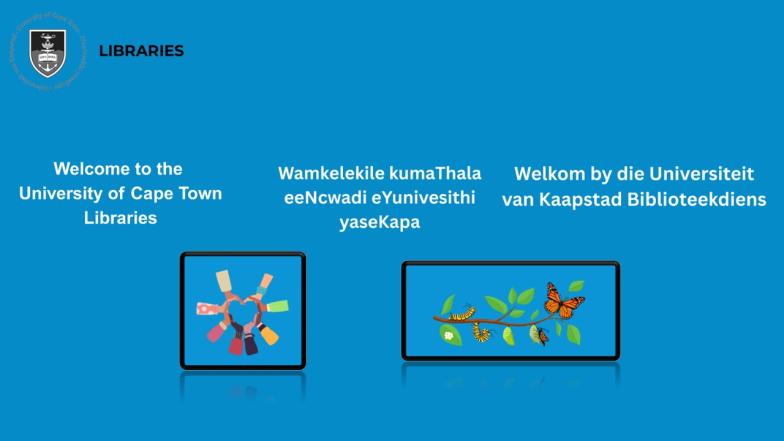
Our staff, our languages
A staff language audit conducted in August 2025 revealed just how richly diverse our community is. Staff reported a language proficiency in no less than 16 languages in total, including 10 of South Africa’s official languages. This linguistic diversity is far more than a statistic. It reflects the cultural richness of our staff and the ways in which we contribute to a sense of belonging for students and the wider university community.
For library users, this means that multilingual support is always within reach, whether through a friendly greeting in a mother tongue or a deeper consultation.

Code-switching in practice
Multilingualism is at the heart of how we welcome students. During library orientation tours, 100UP outreach programmes, and UCT Open Day activities, many staff are able to code-switch fluidly. These efforts extend into one-on-one consultations and training sessions, making learning more inclusive and accessible. The next milestone is the creation of a library glossary in English, Afrikaans, and isiXhosa. This will demystify key library concepts – words like “catalogue” or “database” – by providing plain-language explanations across three widely spoken Western Cape languages. Initiatives like these will ensure that technical knowledge does not become a barrier to student success.
Guides, tools, and tours: learning across languages
UCT Libraries’ multilingual commitment extends into our digital spaces. The LibGuides platform, which provides subject-specific resources curated by librarians, includes guides dedicated to African Languages and Literatures, as well as step-by-step navigation of the library website in isiXhosa.
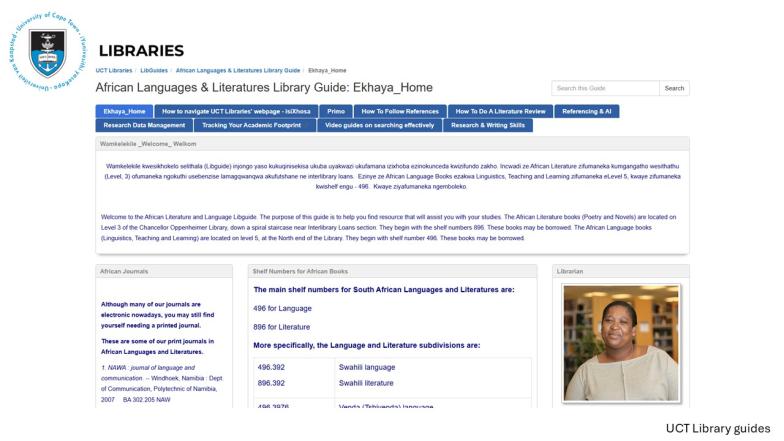
For students who may have missed an orientation, our library audio tours offer another pathway. Available year-round in English, Afrikaans, and isiXhosa, it covers ten stops in the main library and five in the Health Sciences Library. Whether on a mobile phone or a desktop, students can listen to the tour in their chosen language and follow along with transcripts. This initiative ensures equitable access while accommodating different learning styles and preferences.
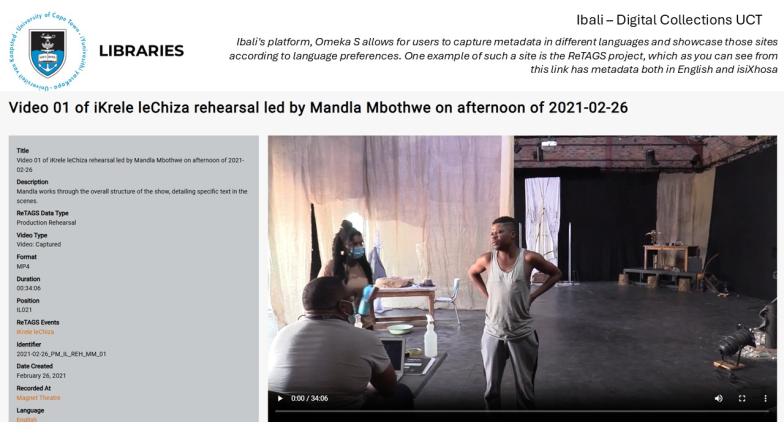
Amplifying African voices through scholarship
Multilingualism at UCT Libraries is not only about access but also about amplifying African knowledge traditions. The OpenUCT repository makes theses and dissertations freely accessible, including those written in South African languages. This global platform allows local voices to resonate internationally, while also serving schools and communities closer to home in languages they understand.
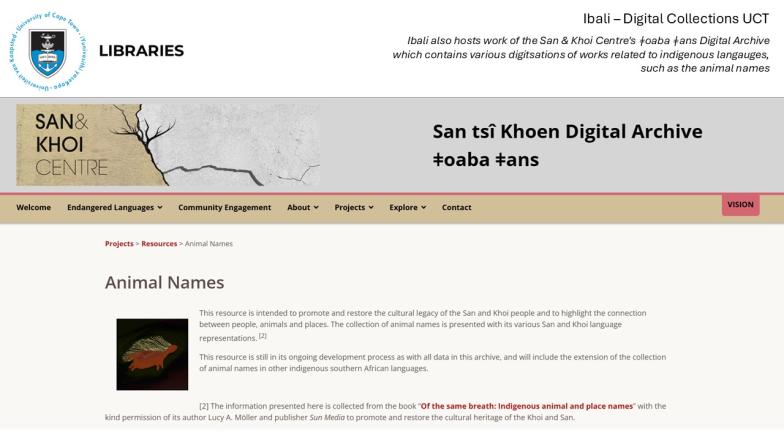
Similarly, UCT Press publishes open access monographs, journals, and textbooks in multiple languages. Works like a Sesotho drama have found readers far beyond South Africa, highlighting the global relevance of African scholarship. By embracing multilingualism in publishing, UCT Press ensures that African research is not confined to English alone but can travel widely in its original voice. To this end, UCT Press is striving towards being a truly African open access Press by publishing peer reviewed scholarship in different African languages.
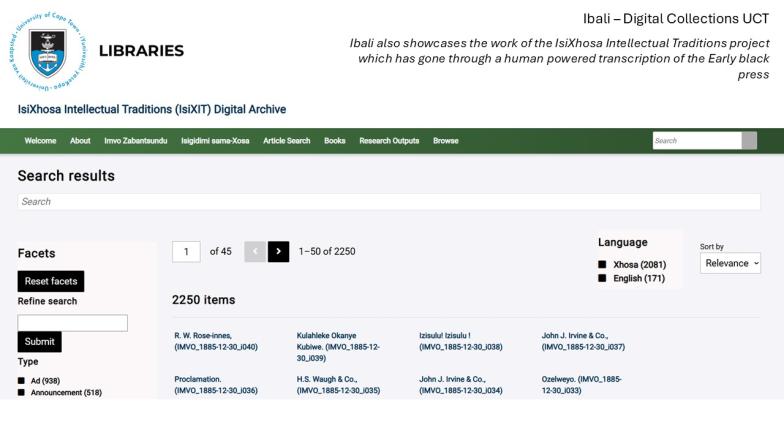
Preserving language heritage
Beyond access and publishing, UCTL safeguards South Africa’s linguistic and cultural heritage. Through Ibali Digital Collections, a wide array of archives and projects are available in multiple languages.
- The ǂKhomani | Hugh Brody Archive hosts over 300 videos, tagged by language, with transcripts available in several languages.
- The IsiXhosa Intellectual Traditions project has painstakingly transcribed the early Black press, making newspapers accessible in both isiXhosa and English.
- The San & Khoi Centre’s ǂoaba ǂans digital archive preserves indigenous language resources, such as traditional animal names.
The Ibali platform has been customized to allow metadata capture in indigenous languages, ensuring that digital collections reflect authentic linguistic contexts.
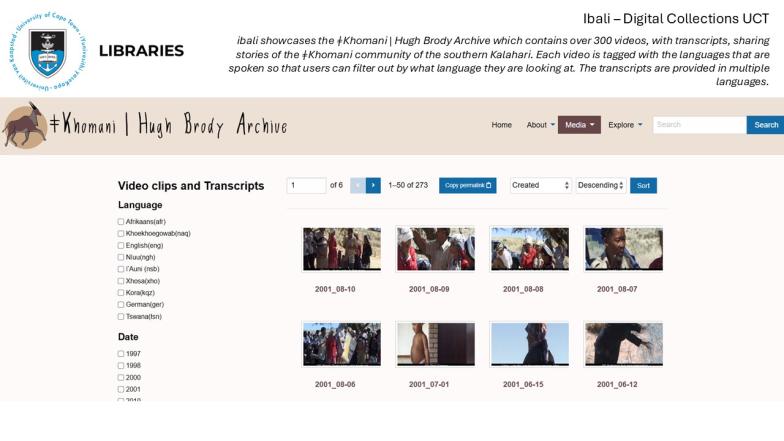
Music, film, and everyday collections
Multilingualism is also present in our everyday cultural holdings. Films in Afrikaans, Sotho, Pedi, Tswana, Venda, Xhosa, and Zulu are available across different branches. Our music collections include works in languages such as Ndebele, Tsonga, Swazi, and beyond. These collections allow students and researchers to engage with South African languages not only as academic subjects but also as living cultural expressions.
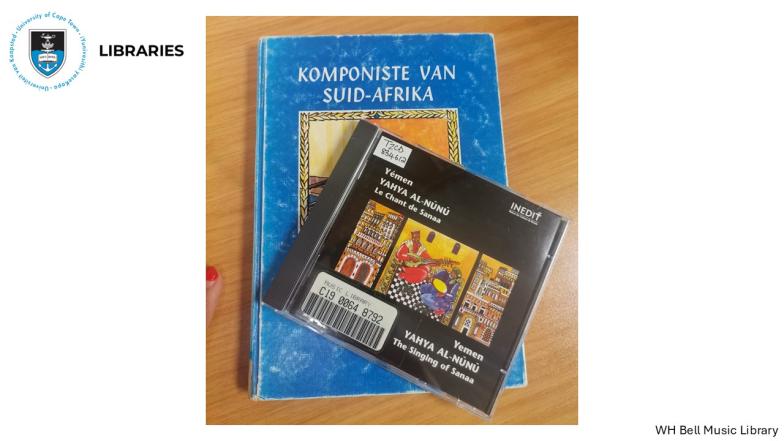
Building a multilingual future
Looking forward, UCT Libraries plan to extend multilingual practices across multiple platforms and services. These include enhancing LibGuides, developing multilingual signage, expanding the library glossary, enriching UCT Press publications, adapting the discovery tool, and introducing a Law Library audio tour in multiple languages. Each of these projects strengthens the principle that UCT Libraries are a space where languages – and by extension, identities – are valued and celebrated.
Multilingualism as transformation
At UCT Libraries, multilingualism is more than translation, it also represents transformation. It ensures that no student is left behind, that African languages thrive in academic spaces, and that cultural heritage is preserved for future generations.
By embedding multilingualism into orientation, consultations, digital resources, publishing, and collections, UCT Libraries reaffirms our role as custodians of knowledge and champions of inclusivity.